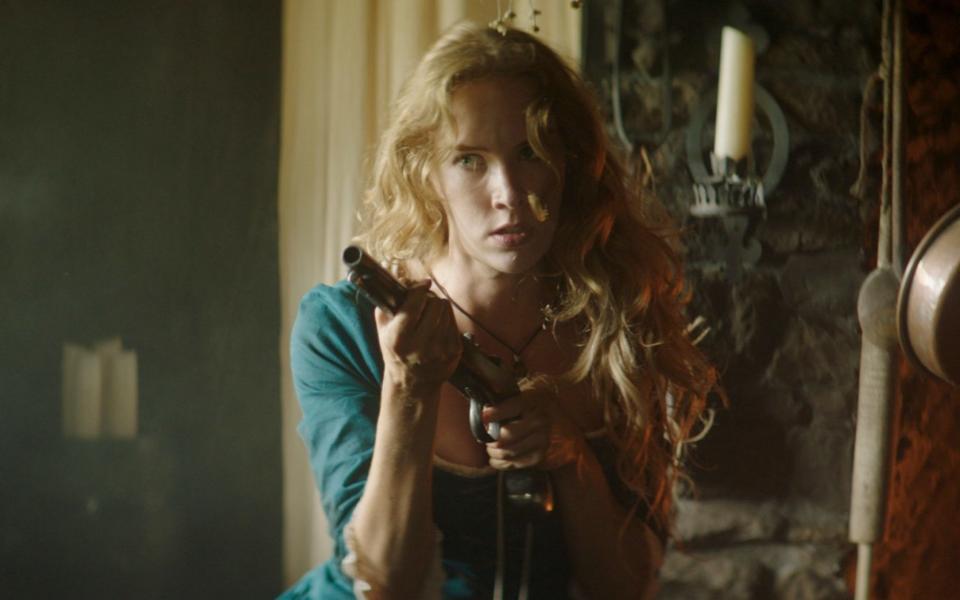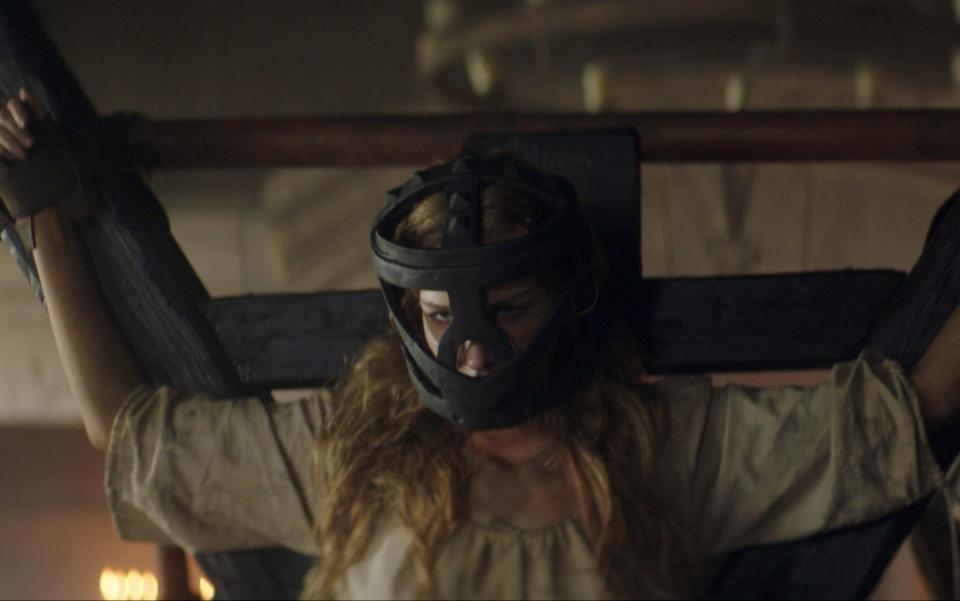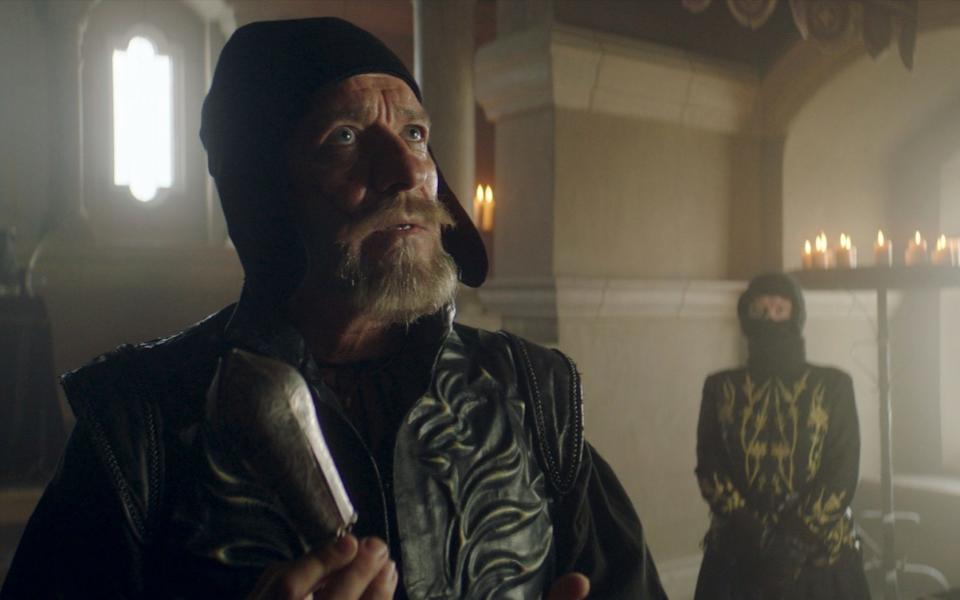Witch trials and plague beaks: Neil Marshall and Charlotte Kirk on making The Reckoning

Neil Marshall has accidentally made a pandemic movie. The Reckoning – out this week in America, and heading to the UK in April – is the director’s sixth feature film, and his first since the flop of the soulless Hollywood-studio reboot Hellboy two years ago. A return to smaller-scale independent filmmaking, The Reckoning takes place in England during the 17th-century witch-trials, in a country ravaged by the Great Plague.
Its resonance today is one that Marshall couldn’t have imagined when filming in the summer of 2019. “It’s too weird for words,” he chuckles on a Zoom call from the home of his Bexleyheath in-laws, with whom he’s currently “bubbling”.
“We even have a sequence where the protagonist self-isolates for a week. When we wrote that, it just seemed like a logical thing. We should have made it two weeks! And of course everyone’s wearing masks. It would be funny if everyone now were wearing the plague beaks [from the film] instead.”
Flash back 18 months, to a time before Covid-19, and we’re in Fót, Hungary, in the scorching July heat. Máriássy Studio has an extensive standing medieval-village set, also used for the blockbuster Netflix series The Witcher. Far from being a series of facades, the buildings feel satisfyingly authentic, and it’s a relief to occasionally step out of the blinding sunshine, into the shade of cool interiors that are in various states of preparation. Producer Daniel-Konrad Cooper is our tour guide: “These are the cells… this is a nobleman’s chamber… this is a tavern where a bit of brutal murder happens.”
For Sean Pertwee, a regular in Marshall’s films, who plays The Reckoning’s villainous witchfinder Moorcroft, this is a return to the scene of one of his earliest roles. “I was filming Cadfael here with Derek Jacobi 26 years ago,” he marvels. “This is Shrewsbury!”
As we cross a drawbridge over an arid moat, and pass some crew members prepping a stake at which “we’ll start burning witches on Saturday”, Marshall reflects that “people keep asking if I wrote the script around the set. I didn’t, but it feels that way. We needed two inns, a village square, a castle courtyard, a portcullis… and it’s all here.”

Those locations are the backdrop for the story of Grace Haverstock (Marshall’s fiancée Charlotte Kirk, also a co-writer), who rejects the advances of predatory local nobleman Pendleton (Steven Waddington). His revenge is to have her thrown in gaol as a witch, pending the arrival of the leather-trewed and eccentrically-hatted Moorcroft, who puts her through a gruesome four-day “inquisition”. When she escapes, her persecutors face the “reckoning” of the title.
The original draft of the screenplay, by Edward Evers-Swindell, was very different to the version audiences are about to watch, as Kirk – covered in an oddly sparkly mixture of make-up and perspiration – tells me during a break from filming. “[Grace] was really a witch, and it was all a bit Carrie, and we didn’t want to do that.
“I suddenly thought, ‘What if there are no witches?’ It ultimately became a survival story about an ordinary woman, and what a mother would do to protect her daughter.”
The result is more psychological than visceral. Marshall says that, despite Grace’s travails with various contraptions – including a complicated looking “x-frame” on which she’s stretched, and the eye-watering, possibly soon-to-be-infamous “pear of anguish” – he categorically didn’t want to make The Reckoning a “torture-porn” film.
“I’m not interested in watching that,” he says, although he admits he couldn’t resist a couple of gory shocks elsewhere, “just for the sheer fun of doing it. I decided to go really brutal a couple of times, rather than semi-brutal lots of times!”
Kirk’s character gallops horses, weathers intense fist-fights and physical torment, spends days in a filthy cell talking to ghosts and devils, endures a violent home invasion and is drenched in a lake. It’s an intense burden for her first starring role, but Marshall says that, since she co-wrote it, “she has no one to blame but herself”.

Máriássy is standing in for an unspecified English town, although the accents of cast members such as Waddington, Leon Ockenden and Mark Ryan suggest we’re Yorkshire-way. In a previous iteration, the film might have gone before the cameras in south Wales, until the opportunity of using Máriássy arose. “I’d originally envisaged it as rainy and grey,” Marshall explains. “When we ended up coming to Fót in the height of summer, the whole approach changed completely.
“Now we’re treating it like a Western. It ties into the history, because there was a heatwave in 1666, which led to the Fire of London. So it’s dusty, and there are horses, hats and long coats – the authentic outfits at the time really match with a Western vibe. Everything’s burnt out, everybody’s sweaty.”
There remains an echo of that palette as originally envisaged, however, thanks to production designer Ian Bailie, who shows me how he’s been “painting the plague onto the walls of the buildings” with bitumen and shellac. “We wanted those blacks to be a metaphorical thing, reflecting the decay all around.”
A key visual reference for the interiors was the painterly candlelight of Stanley Kubrick’s Barry Lyndon. In a long, dark, curtained chamber with a huge dining table as its centrepiece and a roaring fire at one end, we watch Kirk and co-star Suzanne Magowan crash through a brutal fight scene. When the stunt-doubles choreograph the sequence, the table is padded. For the final version… less so. When the actresses themselves step in, it’s no less intense; at one point, Magowan actually breaks the knife she’s wielding.
Later, stuntwoman Zsófia Kocsis is spectacularly set on fire and jumps through a glass window. During the scene, Pertwee has his back to this action. When he watches what happened behind him on the monitor afterwards, he seems almost shaken. But Marshall looks like he’s having fun. “I am, today,” he laughs. “Yesterday was all drama and people talking, in here, in 35-degree heat… Today has more energy!”
A year and a half later, however, some of the energy around the film is filling the director with less enthusiasm. The Covid-19 pandemic means that The Reckoning will barely see British cinemas: after a cursory theatrical release, should any cinemas be open in April, it will head to the horror streaming-service Shudder.
And there’s also an unfortunate ongoing scandal, first alleged by The Hollywood Reporter in 2019, that surrounds Kirk’s prior relationships with various Hollywood “players”. Depending on what you read, she’s portrayed as either a calculating femme fatale seducing moguls as an extortion racket, or a #MeToo survivor being silenced and shamed by powerful men who are desperate not to be tarred with the Weinstein brush.
Given that The Reckoning is about a woman fighting to clear her name in a (literal) witch-hunt, there’s a congruence there to rival the Covid coincidence, but it’s hardly one the production could have wished for. “It’s a lot of hooey,” says Marshall wryly, back on Zoom. “Once somebody publishes a lie, everybody else picks up on it, and it gets repeated again and again. Hopefully we’re at the end of it, but we’ll see. We’re pushing for an apology now.”
Marshall and Kirk can at least console themselves with a clutch of awards from 2020’s horror festival circuit. Though necessarily curtailed by the pandemic, those festivals that took place online were generally supportive of the film. “I loved that festival experience with Dog Soldiers [2002] and The Descent [2005],” Marshall laments, “and I wanted Charlotte to experience that too. Bad timing… but we’re going to do another horror film, so hopefully we’ll get back on the festival circuit with that.”
And despite the circumstances and The Reckoning’s bleak subject matter, there’s room for optimism. “I’m a bit afraid that people won’t be in the mood for a pandemic movie right in the thick of it,” Marshall muses. “But I hope The Reckoning shows that, all things considered, things could be a lot worse. We’ve overcome these things in the past – and we will again.”
The Reckoning is out in the US tomorrow and in the UK in April

